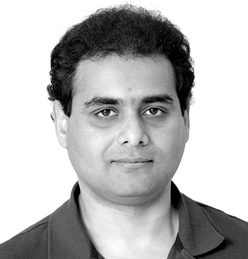Team including DESY theorist develops new COVID app
Press & Communications
Team including DESY theorist develops new COVID app
Until a few months ago, Ayan Paul did not really have anything to do with COVID-19 research. Paul, a particle physicist in the theory group, is an expert in using sophisticated statistical models. "I know a lot about how to process and analyse huge piles of data," he explains. "I learned this by analysing data from the large DESY particle accelerator facilities."
But then the pandemic came, and with it many questions. How, for example, can large data sets improve the world under coronavirus? What insights are hidden in these huge amounts of data that we might be missing? Paul really wanted to contribute his expertise to social issues. "Suddenly life opened up the possibility for me to search for findings that could directly benefit people," the Indian scientist says. "I didn't want to let this opportunity pass unexplored."
One thing led to another, and suddenly Ayan Paul was among the winners of the first Hackathon COVID-19 Challenge. Together with six contestants from all over the world – including a doctor, a biologist and a software developer – he founded the CoVis team. This is also the name of the new app that also successfully passed round two of the Hackathon COVID-Challenge.
The special feature of the CoVis app is that it links medical facts with extensive data records on the local spread of disease as well as a great deal of individual user information such as age, previous illnesses and movement patterns. Using intelligent algorithms, it then determines the personal risk of infection and individual immunity probability. "Data protection was particularly important to us," says Ayan Paul. "All personal data remains with the user." Your data don't leave your phone. In addition, the CoVis app could also support healthcare providers and public institutions in drawing up pandemic guidelines. After all, it aims to prevent infections from occurring in the first place by carrying out individual risk analyses as precisely as possible.
The project is so promising that the CoVis team also secured financial support from the DESY Strategy Fund from the specially set up Corona Call. With the funds, the team can now have professional support the programming of the CoVis app. In addition, the team is currently working on the business plan and business model with the support of the start-up consultants in the start-up office of the ITT department. "We need partners from industry. We also need hospitals, public authorities and other institutions from the healthcare sector to support our project," says Ayan Paul. "That's why we're founding a start-up, even if the basic version of the app should remain free-of-charge."
In his mind, Ayan Paul is already the next step: "We want the app to useful in fighting other epidemics – maybe even the normal flu. But that's still a long way off."

